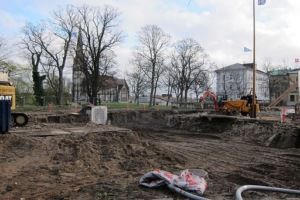News
Stone Age settlement found in the middle of Copenhagen
This article is more than 7 years old.
New finds show that people lived in Copenhagen long before it was today’s modern metropolis

Traces of Copenhagen’s Stone Age past were found under the resistance museum just opposite the Anglican church (photo: Henrik Lundbak, Nationalmuseet)
Archaeologists from the Museum of Copenhagen have made a rather sensational discovery: evidence of a settlement estimated to be around 7,000 years old.
During the building work for the new museum of Danish resistance at Kastellet, flint arrowheads, animal bones and even a couple of human bones have come to light, a municipal press release reveals.
READ ALSO: Unique Stone Age find in Frederikssund
“Finding a Stone Age settlement is special because it reveals the history of the area long before it became Copenhagen,” said the deputy mayor for culture and leisure, Niko Grünfeld.
Enormous historical value
“The settlement sheds light on what is under our feet and also tells us about how people lived, settled and moved around many thousands of years ago. That is of enormous historical value,” added Grünfeld.
Archaeologist think the settlement dates back to 6,400-5,400 BC and the people who lived there came from the so-called Kongemosekulturen. They were hunters in the forests and along the coasts and lived in southern Scandinavia.
At that time, the landscape of Denmark was changing markedly. The seas were rising fast so coastlines and the landscape were also changing.
Over the last 100 years there have been four to five other Stone Age settlements found in Copenhagen.










































